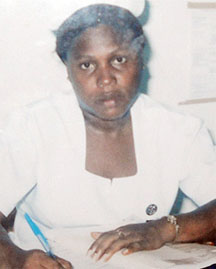Saying that he is not convinced maternal mortality is on the increase based on the numbers recorded in previous years, Director of Medical Services at the GPHC, Dr. Madan Rambarran has pointed to what he calls obvious challenges and not “a collapse of the national programme”.

Dr. Rambarran said public interest in maternal health is higher than it has been in years, attributing this to increased press coverage and greater interest in the Millennium Development Goals (MDGs). He said the record would show that Guyana significantly reduced maternal mortality rates between 1992 and 2003, but the numbers have been holding steady since then.
The Georgetown Public Hospital (GPHC) records around 12-15 maternal deaths annually and according to Dr. Rambarran, “This year is not any worse compared to previous years”. He argued that the hospital handles about 60 percent of the high-risk deliveries in the country, noting that these include older patients, teenage mothers and patients with complications. The complications range from hypertension and diabetes to previous caesarean sections among other issues.
But while maternal mortality rates show no variations the hospital’s neo-natal mortality record has increased this year with a total of 106 deaths as of September; GPHC recorded 97 for the corresponding period last year. However, he pointed out the hospital had a higher number of deliveries this year which is roughly a few thousands.
Still births at the hospital were at 71 cases as of September while it was at 81 cases for the same period last year. GPHC recorded 4090 live births so far this year and annually there are around 6,700 deliveries. National statistics indicate that Guyana records close to 15,000 live births every year and that the GPHC accounts for around 35 percent of that figure.

“Nothing terrible has gone wrong within the past couple of months…the same people who are involved in those unfortunate cases are also delivering thousands of healthy babies and seeing many mothers through their pregnancies”, Dr. Rambarran told Stabroek News in an interview yesterday.
He said that as the tertiary hospital in the country, GPHC is expected to handle the bulk of high-risk cases and according to him, the hospital is prepared to handle every high-risk case but there are obvious challenges. One of the major challenges has been the sector’s ability to recruit and maintain the services of personnel with the clinical expertise, both in terms of doctors and nurses.
Dr. Rambarran said clinical expertise of itself is lacking as are the persons with the expertise to deliver a high quality service which would impact on the current mortality rates. He made reference to the number of consulting-level obstetricians and junior level obstetricians, noting that maternal healthcare requires more trained health personnel who would be in the system for a certain period of time. He cited the high staff turnover in public health as another challenge, adding that sometimes there is a high complement of staff in a particular area that lacks experience and more importantly, the expertise.
He also pointed to collaborations with external partners such as the Chinese government which makes provisions for medical experts to be resident here for two years saying that the system would benefit tremendously if the consultants would be here for more prolonged periods. “..When they get comfortable with our issues their tour of duty is ending”, he observed.
With respect to nursing, he said the hospital is making efforts to increase the number of midwives and registered nurses in the system. He admitted that many are not able to provide the standard of care which the hospital requires and that they also lack the experience. He observed that, “The nursing profession also has a high turnover rate and the issues in nursing are public knowledge…there is salary and morale issues on the job among other things”.
He hailed the residency post-graduate training programme which is now part of the system as one of the major initiatives which are aimed at building capacity. The hospital is collaborating with external agencies to build the programme and according to him GPHC has seen improvement in the surgical services at the hospital. Dr. Rambarran credited this to the surgical post-graduate programme, noting that they recently introduced an emergency medicine programme.
He said the institutional building steps would also result in changes in patient care in the system including how doctors and nurses treat people. “I can’t promise you that someone is not going to react a certain way to a patient, but with capacity building we intend to change these things”, he added.
He observed that many doctors do not communicate with patients and according to him, “this is important”. He said if people are aware of the risks and the real nature of their problems then expectations would be different.
Maternal investigations
Dr. Rambarran said that the hospital is not open to discussing every aspect of a patient’s story with the public, but observed that the system needs to put a mechanism in place to update the public on what is happening in health in the country including maternal deaths.
Commenting on the investigation into the death of GPHC nurse, Charlene Amsterdam who died after delivering a baby at the institution, he said the probe revealed that no human error led to her death. The report found that she developed a complication which was not treatable with the resources available at the hospital. He said her family has since been informed.
He noted that the hospital is reviewing maternal mortality closer than it did five years ago and is now probing every death. GPHC is working with its partners to develop the maternal healthcare programme, Dr. Rambarran said, adding that it is going to take a fair amount of work to “get to where we would like to be”.
Dr. Rambarran said that based on the country’s health expenditure and “what we are getting back” the country has been doing reasonably well. He said countries like Jamaica and Suriname spend a lot more on healthcare per capita and have similar and higher maternal mortality rates respectively.




